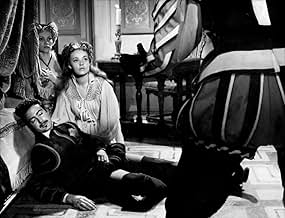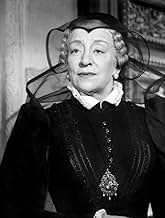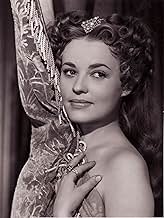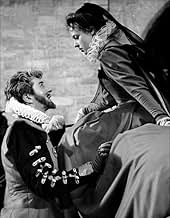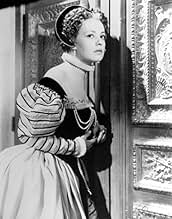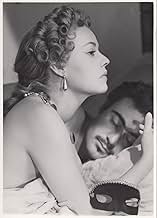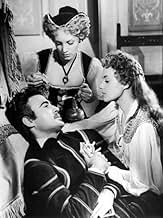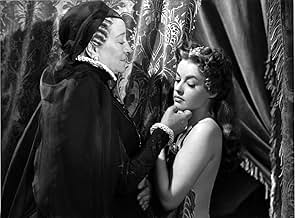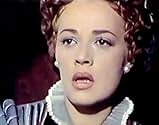Deux cavaliers se rendent à Paris avec un message pour leurs seigneurs respectifs. L'un est un fidèle serviteur d'Henri de Navarre, l'autre du duc de Guise.Deux cavaliers se rendent à Paris avec un message pour leurs seigneurs respectifs. L'un est un fidèle serviteur d'Henri de Navarre, l'autre du duc de Guise.Deux cavaliers se rendent à Paris avec un message pour leurs seigneurs respectifs. L'un est un fidèle serviteur d'Henri de Navarre, l'autre du duc de Guise.
- Réalisation
- Scénario
- Casting principal
Henri Génès
- Annibal de Coconas
- (as Henri Genès)
Jean Témerson
- L'aubergiste de 'La belle étoile'
- (as Jean Temmerson)
Avis à la une
I think it safe to say that by the time he made this Jean Dréville's best films were behind him. Shot in glorious Eastmancolor by Alekan and Hubert with splendid art design by Maurice Colasson and the always excellent costume design by Rosine Delamare this cannot fail to look good but still somehow misses it.
Having impressed as Tsarina Catherine for the same director in 'Jouer d'Echecs' it is only natural that Francoise Rosay should play Catherine de Medicis and suffice to say, she dominates the screen. As Marguerite de Valois Jeanne Moreau draws upon her stage experience, having been the youngest actress ever to have signed a contract with the Comédie Francaise, as well as being eminently filmic. A great artiste whose iconic roles are still to come. The supporting cast however leaves a lot to be desired.
The St. Bartholemew's Day massacre is as graphic as the censorship of the time would allow and is a stark reminder of the depths to which humankind can sink and how deadly is the combination of religion and politics.
Having impressed as Tsarina Catherine for the same director in 'Jouer d'Echecs' it is only natural that Francoise Rosay should play Catherine de Medicis and suffice to say, she dominates the screen. As Marguerite de Valois Jeanne Moreau draws upon her stage experience, having been the youngest actress ever to have signed a contract with the Comédie Francaise, as well as being eminently filmic. A great artiste whose iconic roles are still to come. The supporting cast however leaves a lot to be desired.
The St. Bartholemew's Day massacre is as graphic as the censorship of the time would allow and is a stark reminder of the depths to which humankind can sink and how deadly is the combination of religion and politics.
Imprimis: J.G. Correa's critique contained an error--"Nota Bene that the St. Bartholomew's Day massacre was NOT re-enacted in this Abel The Abel Gance/Jean Dréville version." My memory of the film disputes that error in the critique It most indubitably WAS "re-enacted".
I saw the film in 1954 in a village named Yatchi near Sendai in Honshu, Japan when I was a mere stripling of ten years. I fled the movie house when the massacre of St. Bartholomew was enacted, traumatized by the sight of Huguenot women being stripped of their shifts and then put to the sword by the Catholic subjects of Charles IX. As a young American film-goer I had never seen female nudity on the screen. Earlier in the film, Jeanne Moreau as Queen Margot wears a see-through chemise where one's voyeuristic sense was aroused by the sight of her nipples et al. In comparison, American historical films were sanitized and the McCarthyite atmosphere of the time would have not allowed such a film to be shown on American soil. Nevertheless in post-war Japan it was screened along with other French films noires featuring the great Jean Gabin in a primitive movie house with wooden benches to sit upon. An excellent film which I truncated by not waiting to see it to the end.
I saw the film in 1954 in a village named Yatchi near Sendai in Honshu, Japan when I was a mere stripling of ten years. I fled the movie house when the massacre of St. Bartholomew was enacted, traumatized by the sight of Huguenot women being stripped of their shifts and then put to the sword by the Catholic subjects of Charles IX. As a young American film-goer I had never seen female nudity on the screen. Earlier in the film, Jeanne Moreau as Queen Margot wears a see-through chemise where one's voyeuristic sense was aroused by the sight of her nipples et al. In comparison, American historical films were sanitized and the McCarthyite atmosphere of the time would have not allowed such a film to be shown on American soil. Nevertheless in post-war Japan it was screened along with other French films noires featuring the great Jean Gabin in a primitive movie house with wooden benches to sit upon. An excellent film which I truncated by not waiting to see it to the end.
While this may share the same source material as Patrice Chéreau's picture of the same name to follow forty years later, there's no mistaking that Jean Dréville's rendition of 'La reine Margot' is its own picture. Likewise adapted from the novel by Alexandre Dumas, this 1954 film boasts the same narrative essence. It can claim beautiful sets and filming locations, and elaborate costume design, in imparting a tale of murder, massacre, deceit, manipulation, and backstabbing. And recognizing that the film-making sensibilities of the 50s were not the same as those of the 90s, early cinematic master Abel Gance penned a screenplay that deftly communicates the story while maintaining a feeling of restraint, and mostly declining sensationalism. There are sturdy foundations here.
Unfortunately, for all that Chéreau and Dréville share in common, the utmost high quality is not entirely among them. Dréville's feature is good, and there are some moments that are done especially well in one fashion or another. Yet that broad declination of sensationalism also results in a presentation so even-keeled that dynamics, urgency, and major drama are diminished in the process. This is in addition to Dréville's direction coming across as a little weak, or even scattered, further dampening the weight of the tale at hand - and whether Gance's adaptation or Dréville's direction is more to blame I don't know, but there are points where it seems to me like this 1954 movie is deficient in basic details like identifying characters, or the relationships between them, or even conveying the plot with total fidelity.
The acting is fine, but struggles to make much of an impression through the flatness that reduces the drama. The editing is sometimes quite curt, and rough around the edges, and there are choices here even of lighting that raise a curious eyebrow. Fantastic as the sets are, every now and again the artifice is more readily evident; I do quite like the costume design, though it's noteworthy that the tights portend the more jovial gaiety that defines no few sequences as this 'La reine Margot' carries itself in no small measure more like an outright swashbuckler. Where that isn't true, what is true is that this feels like a relatively simple, unbothered costume drama, and one that just particularly make the audience feel the import of the saga on hand. It's not bad - but nor is it especially noteworthy or remarkable.
I did enjoy watching, on some level. But there's nothing about this so striking as to demand viewership, and moreover, even at its best it comes off as a title that would take low priority standing next to most anything else one could watch. Stand it next to Chéreau's film and, well, the very word "comparison" seems unfair. It's a decent way to spend a couple hours, but nothing you need to go out of your way to see. 1954's 'La reine Margot' is worth checking out and remembering - with the caveat that it's just not everything that it could have been.
Unfortunately, for all that Chéreau and Dréville share in common, the utmost high quality is not entirely among them. Dréville's feature is good, and there are some moments that are done especially well in one fashion or another. Yet that broad declination of sensationalism also results in a presentation so even-keeled that dynamics, urgency, and major drama are diminished in the process. This is in addition to Dréville's direction coming across as a little weak, or even scattered, further dampening the weight of the tale at hand - and whether Gance's adaptation or Dréville's direction is more to blame I don't know, but there are points where it seems to me like this 1954 movie is deficient in basic details like identifying characters, or the relationships between them, or even conveying the plot with total fidelity.
The acting is fine, but struggles to make much of an impression through the flatness that reduces the drama. The editing is sometimes quite curt, and rough around the edges, and there are choices here even of lighting that raise a curious eyebrow. Fantastic as the sets are, every now and again the artifice is more readily evident; I do quite like the costume design, though it's noteworthy that the tights portend the more jovial gaiety that defines no few sequences as this 'La reine Margot' carries itself in no small measure more like an outright swashbuckler. Where that isn't true, what is true is that this feels like a relatively simple, unbothered costume drama, and one that just particularly make the audience feel the import of the saga on hand. It's not bad - but nor is it especially noteworthy or remarkable.
I did enjoy watching, on some level. But there's nothing about this so striking as to demand viewership, and moreover, even at its best it comes off as a title that would take low priority standing next to most anything else one could watch. Stand it next to Chéreau's film and, well, the very word "comparison" seems unfair. It's a decent way to spend a couple hours, but nothing you need to go out of your way to see. 1954's 'La reine Margot' is worth checking out and remembering - with the caveat that it's just not everything that it could have been.
The comparison, here, is unavoidable. This is the first version, dated 1954, with a fine cast led by Jeanne Moreau in her very beginnings, a competent mise-en-scène (Jean Dréville), a fine score (as usual) by Paul Misraki, a fine Eastmancolor photography by Henri Alekan and, last but not least, a script by silent-screen pioneer, Abel Gance, the celebrated author of Napoléon. Now, what could we say of the so-called remake 40 years later? Hardly anything to do with Dumas Père or, for that matter, good cinema. Most surely the writer would be as horrified as I was with such self-boosting display of an ego trip by Monsieur Chéreau, a kind of sub-Peter Brook theatrical régisseur in France. Nota Bene that the St. Bartholomew's Day massacre was re-enacted in this Gance/Dréville version, a more subtle, although more sarcastic, even cruder picture than its ill-timed successor.
This is a good movie, and although camparisons with its 1994 successor are inevitable, it wears well on its own and better in some ways. This is old-fashioned French film making, not noticeably different from Hollywood historical epics of the same era w/ the exception of a flash of nudity here and there. It is important to remember that at the time of this film, only Gance (screenplay) was an international legend. Moreau is fine as Marguerite de Valois & Françoise Rosay as Catherine de Medicis does a good job of chewing up the scenery. The '54 style potrayal of Henri d'Anjou as a very effeminate homosexual has been proven to be historically inaccurate, but Daniel Ceccaldi is amusing in the part. The acting for Charles IX, De la Mole, Coconnas et al is up to '54 par, acceptable and not terribly detracting from the story.
The inevitable discussion will be around comparing the two version, '54 & '94. Chereau lifted entire sections of the screenplay from 1954, and didn't do a bad job with them, for all that. A more faithful adaptation of the Dumas père novel, the '54 version cannot really be said to be a better movie. It is more "French," to be sure, and less sensationalized, but it, too, drags in spots just as the '94 does. The St. Bartholomew's Day massacre IS depicted, but not in an overlong and blood-drenched manner.
Moreau is rather cool as Marguerite whereas Adjani is overwrought in the '94, but both actresses give fine performances, each in their own manner.
This '54 version is a movie for an older generation, perhaps more academic in its approach, whereas the '94 is for a younger generation who like more zap and pizzazz in their cinematic representations.
The inevitable discussion will be around comparing the two version, '54 & '94. Chereau lifted entire sections of the screenplay from 1954, and didn't do a bad job with them, for all that. A more faithful adaptation of the Dumas père novel, the '54 version cannot really be said to be a better movie. It is more "French," to be sure, and less sensationalized, but it, too, drags in spots just as the '94 does. The St. Bartholomew's Day massacre IS depicted, but not in an overlong and blood-drenched manner.
Moreau is rather cool as Marguerite whereas Adjani is overwrought in the '94, but both actresses give fine performances, each in their own manner.
This '54 version is a movie for an older generation, perhaps more academic in its approach, whereas the '94 is for a younger generation who like more zap and pizzazz in their cinematic representations.
Le saviez-vous
- ConnexionsFeatured in Legendy mirovogo kino: Jeanne Moreau
Meilleurs choix
Connectez-vous pour évaluer et suivre la liste de favoris afin de recevoir des recommandations personnalisées
Détails
- Durée
- 1h 46min(106 min)
- Mixage
- Rapport de forme
- 1.37 : 1
Contribuer à cette page
Suggérer une modification ou ajouter du contenu manquant

